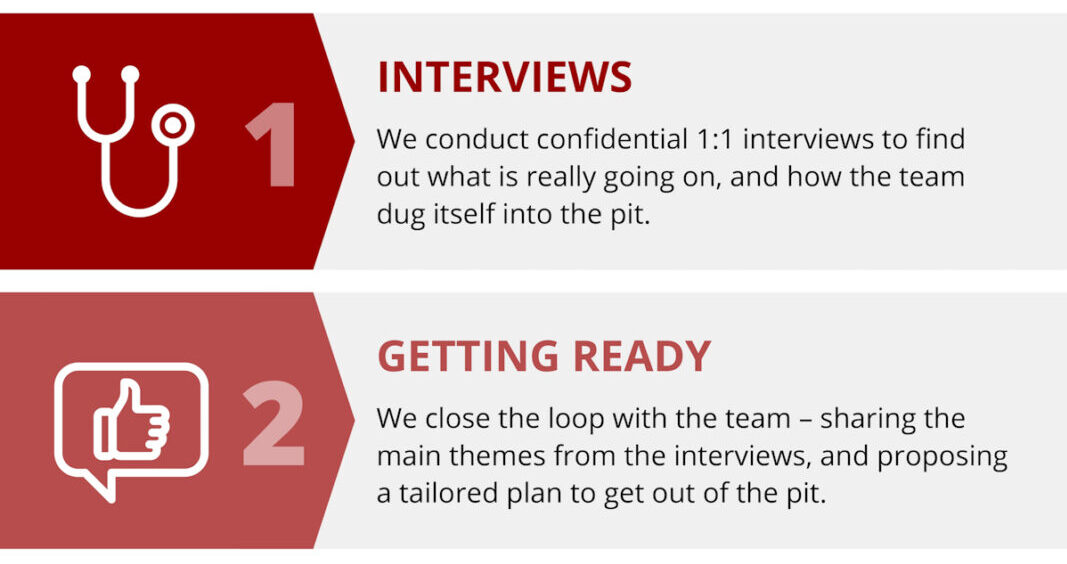How do you transform the dynamics of a team (leadership or otherwise) from dysfunctional to…
Stay away from hollow management speak

Which corporate buzzword do you find the most annoying these days – and why? Vent via the comment box at the bottom of this article 😉
Sadly, the opinion-piece below which I wrote a few years ago for Canadian HR Reporter remains as relevant as ever…
——————
During my last trip to France, a friend gave me a document which looked like a communication aid for managers. Titled “le parler creux sans peine”, which roughly translates as “hollow speak made easy”, the document mocks the buzzword-laden communications favoured by hordes of managers and consultants, in France and around the world.
Developed by French author and management advisor Didier Noyé, this caricature of a tool consists of a single table. Its cells feature words commonly found in corporate communications. In English, the table would look like this:
Noyé’s hollow-speak-made-easy table
| Problem solving | reinforces | the qualitative | processes | of performance |
| The business model | clarifies | the strategic | parameters | of the organization |
| Training | modifies | the systemic | results | of the team |
| Rephrasing | improves | the analytical | needs | of the project |
| Innovation | highlights | the participative | know-how | of the stakeholders |
| Experience | changes | the motivational | concepts | of the market |
The table makes it very easy to generate impressive sentences: simply combine any word from the first column with any word from each of the other columns, respecting the sequence.
Here are a few examples:
The business model reinforces the analytical parameters of the market
Problem solving highlights the systemic needs of performance
Innovation changes the strategic know-how of the organization
Wow! That sounds impressive, doesn’t it? I know, it doesn’t really mean anything. That is obviously the point Noyé intended to make.
Somehow, this hollow-speak-made-easy table has stuck to my mind. Almost daily now, I come across sentences in English that look like direct products of the table. Below are some recent examples from Corporate Canada. To be fair, I could probably have found examples in my own writing or speeches.
- The senior HR executive at a large, iconic corporation said to a group of HR professionals: “to succeed and get promoted, research and apply best-practices that contribute to bottom-line success, and deliver strategic value through innovative human capital strategies”.
- A world-famous business author wrote in his latest book: “Networked models of innovation and value creation can bring the prepared manager rich new possibilities to unlock innovative potential in a wide range of resources that thrive inside and outside the firm”.
- The CEO of a major Corporation stated in his latest Annual Letter to Employees and Shareholders: “Future growth in our wholesale business will be supported in core areas of our business where we have capacity, and within the parameters of our target business mix”.
I am sure these sentences stem from great thoughts and insights. However, they are laden with buzzwords. The American Heritage Dictionary defines buzzword as: “A word or phrase connected with a specialized field or group that usually sounds important or technical and is used primarily to impress laypersons.”
With all the buzzwords, these three authors appear eager to show off and impress. The perspective is that their communication is shallow and meaningless.
To make matter worst, people in organizations have grown sick and tired of management buzzwords. Just look at the popularity of BuzzWhack.com, a Web site catering to folks who enjoy “bursting the bubbles of the pompous.”
The more buzzwords managers use, the more cynical employees become about management.
The basic purpose of management communication should be to say something that employees can easily understand. So that they can either react, ask questions, or move into action. The objective is not to sound impressive, nor is it to confuse people or turn them into cynics. Yet, that is exactly what occurs when managers rely on hollow speak.
Drop by the water cooler after an “all employees e-mail” from the big cheese; a presentation from the latest management consultant; or a speech from an MBA-decorated boss. Listen to the reactions from employees. Are they clear on the message, or are they confused and cynical? The answer will tell you whether the management talk was hollow.
Goodle’s co-founder Sergey Brin firmly believes that success comes from simplicity, saying it has been the foundation for his search engine’s wild success. Similarly, Paul Tellier, former CEO of CN Rail and Bombardier, said in an interview there are two types of managers: the ones who make things simpler, and the one who made things more complex. Tellier explained that, throughout his career, he highly valued the former but had little patience with the latter. Which group do you think relies more on hollow speak?
Simplicity might not be the “magic bullet” of corporate success, but it is critical to any management communication. When the message is simple, it can be understood and acted upon. It doesn’t reinforce the cynicism about management that prevails in organizations.
Therefore, we should all make a serious effort to stay away from hollow management speak. Below are a few pointers.
- Keep the English version of Noyé’s table handy, and regularly test your sentences: do they appear to come from the table?
- Visit Web sites like BuzzWack.com to stay abreast of the worst buzzwords, and stay away from them. For 2006, the BuzzWack.com’s readers have selected as their Top 5 Most Dreaded Buzzwords: Leveraging our assets; Mission-critical; Conversate; Information touchpoint; and Synopsize.
- Don’t adopt too easily the trendy expressions used by your favorite management consultant or book author. You are a manager, not a parrot.
- And, please, tell me if you notice any hollow speak in this article or my future commentaries.
Copyright © 2007 by ORCHANGO. All rights reserved.




For me it’s RATIONALIZE!! Why they don’t say what it really is: CUT STAFF!!! 🙁